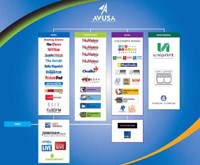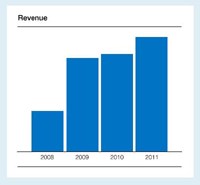The trading statement said that earnings per ordinary share, for the six months to 30 September 2011, are expected to be between 55% and 65% below the previous corresponding period and headline earnings per ordinary share are expected to be between 85% and 95% below the previous corresponding period.
According to the trading statement, the results will include poor trading at the entertainment and books units, legal costs arising from the buyout bid by private equity firm Capitau - which is now off the cards - and costs resulting from the separation agreement with former CEO Prakash Desai.
Company in "closed" period"
We will know more when the interim results are released and until then, Robertson cannot comment because, according to JSE rules, the company is in a "closed" period.
What we can say for now is that the second half of Avusa's financial year - which includes Christmas - traditionally brings in more revenue than the six months to the end of September. And the costs incurred with Capitau's bid and the separation agreement with Desai are unique events - though clearly rather expensive ones for a company the size of Avusa.
Desai, it was reported by Avusa's own Business Live unit, is understood to have been paid out R28 million, while Business Report said that he was granted share appreciation rights of more than R2.5 million on the day on which he stepped down.

Avusa group structure. Source: Avusa.co.za.
click to enlargeAt least Desai can look forward to a very merry Christmas. Because it is possible that worries about economic contagion may mean that a festive-season bounce-back will be dampened for Avusa's books and entertainment businesses (that include Exclusive Books, NuMetro and Gallo) and in the form of advertising revenue for Avusa's newspapers such as the Sunday Times, Sowetan, Sunday World, Daily Dispatch and The Herald.
Bogged down by legacy businesses
The truth is that it's hard being in media anywhere in the world today, and Avusa is bogged down by legacy businesses.
Some - myself included - have questioned the quality of the company's management and, this year, we saw an extraordinary boardroom battle play out amid the Capitau bid that ended in the exit of Desai and Dumisa Ntsebeza, the Avusa chairman.
The question is: where to from here? How and where should Avusa cut costs? Should the company rethink its business completely? Does the existing Avusa management have the savvy and imagination to get it right?
Two most-recent decisions
For signs of the management's thinking, let's look at the two most-recent decisions to effect change: cutting Zappon and moving the Daily Dispatch's printing to PE.
- What's the deal? Zappon was set up in March 2011 at low cost and with a small team on short-term contracts. Unluckily, the global Groupon deals site moved into SA shortly before Zappon launched.
Elan Lohmann, MD of Digital Avusa, told Bizcommunity that Zappon had failed to perform as well he had wanted and it was prudent to put in on ice while he concentrated on the core businesses. The technology developed for Zappon remains with Avusa and may well come in handy down the line.
Verdict: A sensible move as Zappon seems like a nice-to-have and this accords with what's going on at 24.com - which is also pulling back from areas of its business that are not showing potential to grow.
- What's the deal? The Daily Dispatch has been sitting on an aging press for quite some time and it emerged in September that the company was considering shutting the press and moving printing to The Herald's press in PE - about three and a half hours' drive from East London. Bizcommunity has reliably established this week that this will now happen in February. It's a move that will save money as the running costs of the Dispatch press will fall away and it involves retrenchments in the East London press room.
Verdict: A tricky one but I have to question the wisdom of Avusa management here. It's hard to make the business case for a new press in East London but one questions the timing of the move. Is the East London press so imminently on death's door? Further, the move means the Dispatch's editorial deadline will be earlier - not a good thing for a daily paper and it will inevitably weaken the content offering.
It will also put at risk the paper's "country" sales, such as in Transkei that makes up 20% of circulation (which is important when you have a circulation of 29 000). The area most at risk is the Transkei - a traditional heartland for the Dispatch and where Media24 is making inroads with community papers. Because the roads are so poor in the Transkei, commuters get going very early and, if you don't get your papers there by about 6.30am, you lose a lot of sales. If the Dispatch's sales start to decline next year, don't believe it if Avusa tells us it is because of adverse trading conditions. It will be because of Avusa management.
Compare, for instance, the Dispatch to another small-town paper, The Witness in Pietermaritzburg, which acquired a brand new press after Media24 bought into the paper in 2000. Pietermaritzburg has now become a major commercial printing centre.
Trimming the fat
Cost-cutting can be an excellent thing when it involves trimming the fat - and when that phrase comes up, I can tell you that the eyes of many Avusa employees turn to the flagship Avusa title, the Sunday Times, and its peculiar daily sister paper, The Times.
The Sunday Times is considered by many to have too many chiefs and too few Indians. This would be hunky dory if the paper can keep bringing home the bacon in a big way but times are tough everywhere. And then there's The Times, which is distributed for free to Sunday Times subscribers.
Many in the company - and in media circles generally in South Africa - doubt Avusa when it says The Times has reached profitability because the company has not produced the figures to back up the claim - even in annual results.
AIS/AdEx Nielsen numbers for the first six months of this year show that The Times brought in R31 394 718 in ad revenue - minus self-promotion ads - although the total figure is likely to be lower because AdEx figures cannot take discounting into account. This averages out at about R5.2 million a month.
Seems unlikely
Even if you add in revenue from cover price - which, at R2.20, is relatively low - for the 38 000 plus copy sales, it seems unlikely that it would cover the costs of a national paper's, including newsroom salaries, sales and support staff, paper, printing and a large distribution network.
Despite Avusa executives' insistence that the costs of the paper are very low, many in the company are convinced that some of The Times' costs are being allocated to the Sunday Times and, if anything should be cut, The Times should be the first to go.
I have sometimes wondered if Capitau - when it got it hands on all the Avusa numbers in the due diligence this year before the proposed acquisition - got a fright and fell happily on the get-out clause of needing pre-approval requirements in terms of the Income Tax Act before it could make a firm offer.
Capitau has not made another offer for Avusa since the talks were terminated at the beginning of October.
So is Avusa cutting costs to maintain profit margin or to survive? We will know next week when the interims come out but one thing we all know for certain: there is ever-decreasing room for poorly managed media companies in the future.
For more:









































